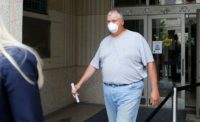
On a Saturday morning in the summer of 1966, Vinton Bacon, general superintendent of the Metropolitan Sanitary District of Chicago, pulled his car into a service station near his suburban home for gas and an oil check. The attendant found four sticks of dynamite wired to the car’s engine. Only a faulty connection prevented them from exploding.
During the previous four years Bacon had attacked corrupt practices at the agency, “earning the resentment, even hatred, of many politicians, district employees, contractors, union officials, suppliers, and a larcenous organization known in Chicago as The Syndicate,” according to an ENR article. The agency managed wastewater and stormwater for Chicago and over 100 adjoining municipalities, serving five million residents, encompassing an area of 858 sq miles, with a workforce of 2,100.
During 1961, Chicago Tribune reporter George Bliss wrote a cascade of articles detailing how workers in the District were being paid for no-show jobs; about a gambling, drinking and sleeping club in one of the District’s plants; and a cover-up by the District’s personnel director. Bliss discovered and made public that the agency’s payrolls were larded with more than 1,000 political and labor sponsored jobholders, while by law only 19 positions were exempt from civil service status. Bliss received the Pulitzer Prize for local reporting in 1962.
Additional reporting by Chicago newspapers and civic organizations “turned up dishonest real estate deals, overpayment for electrical supplies, overpriced contracts going to friends of MSD officials, MSD engineers on the payrolls of contractors whose jobs they were supervising, unnecessary contracts, unfulfilled contracts, and responsible jobs in the hands of incompetents and criminals.”
This intense exposure led Mayor Richard Daley to appoint a blue-ribbon panel of seven business, labor and civic leaders to find a new MSD general superintendent. He told the panel to offer the MSD board of trustees a slate of three candidates to choose from. After a five month search, during which they interviewed 60 candidates, the panel instead proposed one candidate instead of three: Bacon.
Bacon possessed a remarkable blend of academic stature, technical accomplishment, and managerial ability. After earning his civil engineering degree at the University of California at Berkeley, his first job was with the East Bay Municipal Utility District. At the Los Angeles County Sanitation District he conducted cost studies and analyzed treatment plant operations. During World War II he served with the U.S. Public Health Service, setting up training and contracting for typhus fever control programs in San Antonio. For six years he served as executive officer of the California State Water Pollution Control Board, doing applied research, developing statewide policy, coordinating the work of nine regional boards and testifying before state and congressional committees.
After Bacon was given the post of general superintendent in November 1962, he discovered he was being handicapped. When he tried to fire the MSD personnel chief for incompetence, Bacon found he did not have the authority to hire or fire his high-level staff members. After he pushed back, the board gave him the authority he needed. During his first three years Bacon shrank the patronage employees on the payroll from 900 to 150. He also instituted rules that slashed absenteeism by more than 30%. Contractors who failed to meet deadlines paid about $400,000 in fines (about $4 million in 2024 dollars).
In June 1966, Bacon discovered irregularities in the results of an MSD exam given to operating engineers. An investigation by an independent consultant found statistical and physical evidence of fraud. Thirty nine answer papers had been removed and replaced by other answer papers with more right answers, and the answers of four candidates with passing scores had been changed to give them failing scores. The bomb in Bacon’s car was found the same day news broke that the state attorney general was opening an investigation into the test rigging.
Later that same day Bacon told reporters he would be in his office the following morning and planned to continue his vigorous investigation of the rigged exams. “I am not running from any investigation because someone tried to kill me,” he said. “A deed like this certainly indicates that we’re on to something that has some people badly shaken up.” Police were assigned to guard Bacon, his home, and his family, including his college student daughter.
Two months after the car bomb attempt, Bacon received a letter threatening his life. He speculated that the second threat may have been triggered by his announcement that he had found evidence of fraud in the results of an earlier MSD exam for crane oilers given in 1964.
On another front the District, under Bacon’s prodding, filed a $10.5-million, six-count damage lawsuit against a sewer contractor for faulty work on a project completed in 1962.
In November 1966, Chicago voters showed their strong support for Bacon’s fight against corruption, electing all four Republican candidates on a reform slate for MSD trustee positions, defeating four Democratic incumbents who had frequently been opposed to Bacon’s efforts.
Bacon’s courageous work resulted in his being named ENR’s Man of the Year (now known as the ENR Award of Excellence) in 1967. Later that year, Illinois Governor Otto Kerner signed a law giving Bacon power to appoint the agency’s purchasing agent, personnel chief, attorney, clerk and director of research and development, taking these powers away from the trustees. But battles between Bacon and the old guard persisted, culminating in their firing him in 1970.
Bacon’s obituary in the Chicago Tribune in 1997 quoted his son Donn: “An Illinois State Senate commission found that his firing had been unjust and improperly carried out. He was further vindicated when several of the trustees responsible for his firing were indicted on criminal charges.”
Bacon went on to teach civil engineering at the University of Wisconsin at Milwaukee.





